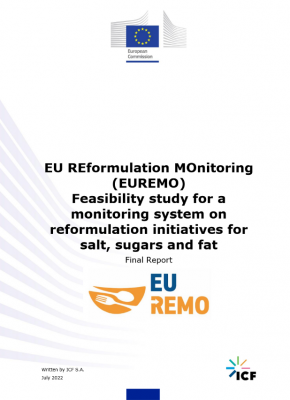Details
- Publication date
- Authors
- European Health and Digital Executive Agency (European Commission), ICF S.A
- Publisher
- Publications Office of the European Union
- Related department
- European Health and Digital Executive Agency
- ISBN
- 978-92-95224-18-6
- DOI
- 10.2925/308861
- Catalogue number
- HW-04-22-088-EN-N
Abstract
Food reformulation initiatives have an instrumental role to play in improving public health outcomes. They involve the modification of manufactured foods to improve their nutritional value by reducing the presence of harmful ingredients including salt, sugar and saturated fat. Healthy food environments have been identified as a key component in preventing obesity which, despite national and pan-European efforts, continues to be a significant public health challenge. As part of these efforts, reformulation initiatives have been implemented in several European countries.
However, monitoring their effectiveness and progress is a challenge due to resource constraints and differences between available nutrition composition databases. Overcoming these constraints by creating a sustainable and transferable monitoring system is vital for assessing the effectiveness of reformulation activities.
This study develops and tests a monitoring process for assessing the impact of reformulation initiatives on a range of ‘nutrients of interest/concern’ by collecting primary data on the composition of over 45,000 processed food and drink products available for purchase by the general public in 16 European countries. In addition, the study provides support to national public authorities to implement reformulation initiatives by organising workshops, twinning actions and scientific and technical support to reformulation initiatives.

